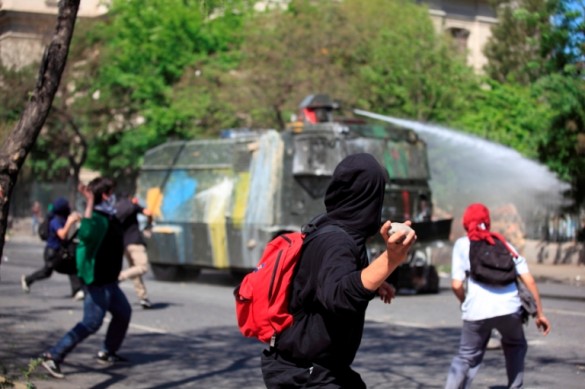 Protesters in Chile (iStock)
Protesters in Chile (iStock)
More protests in Chile like those that shocked the political elite there in 2011 may lie in store for the country in upcoming years, according to a public opinion survey by Vanderbilt University’s Latin American Public Opinion Project (LAPOP).
Conditions – including a groundswell of young, educated and politically interested citizens – remain fertile for protests, despite a quiet 2012 on that front.
[lquote]“A newly politicized and active younger generation is at the forefront of a growing reliance among Chileans on contentious politics as a means of expressing its political voice,”[/lquote] write the authors of the new report “Social Protest in Chile: Causes and Likely Consequences.”
The report, released Sept. 16 by LAPOP, was written by Juan Pablo Luna, LAPOP’s country team leader for Chile and associate professor of political science at Instituto de Ciencia Politica, Pontificia Universidad Católica; along with co-author Sergio Toro Maureira of Universidad Católica de Temuco.
LAPOP develops, implements and analyzes the AmericasBarometer public opinion surveys. Since the 1970s, LAPOP has gathered a treasuretrove of opinion data containing political perspectives from Latin American and Caribbean citizens. LAPOP data and reports are available to interested researchers at the LAPOP website.
When surveyed in 2010, 4.7 percent of Chileans reported having participated in at least one public protest in the past year. Asked the same question two years later, more than 11 percent reported being protesters. The authors find that while older Chileans are likely voters but unlikely to participate in protests, young voters tend to also take their political grievances to the streets.
The protests of 2011, dubbed the “Chilean Winter” or “Chilean Education Conflict” by some, were student-led protests demanding an end to profit in higher education and more direct state participation in secondary education. These core issues then gave way to a larger protest movement driven by a more general dissatisfaction with the Chilean political system.
“The protest wave of 2011 had various political effects, including the emergence of new political leadership and organizations that will likely become key political actors in years to come,” Luna and Maureira write. “The 2011 protest wave seems to have yielded the articulation of a ‘social movement’ that seeks political and social change in the country, and that is prepared to participate in both institutional and non-institutional political arenas.”